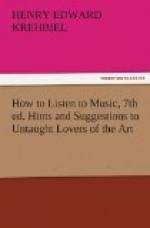“A taste or judgment,” said Shaftesbury, “does not come ready formed with us into this world. Whatever principles or materials of this kind we may possibly bring with us, a legitimate and just taste can neither be begotten, made, conceived, or produced without the antecedent labor and pains of criticism.”
[Sidenote: Comparative qualifications of critic and public.]
Grant that this antecedent criticism is the province of the critic and that he approaches even remotely a fulfilment of his mission in this regard, and who shall venture to question the value and the need of criticism to the promotion of public opinion? In this work the critic has a great advantage over the musician. The musician appeals to the public with volatile and elusive sounds. When he gets past the tympanum of the ear he works upon the emotions and the fancy. The public have no time to let him do more; for the rest they are willing to refer him to the critic, whose business it is continually to hear music for the purpose of forming opinions about it and expressing them. The critic has both the time and the obligation to analyze the reasons why and the extent to which the faculties are stirred into activity. Is it not plain, therefore, that the critic ought to be better able to distinguish the good from the bad, the true from the false, the sound from the meretricious, than the unindividualized multitude, who are already satisfied when they have felt the ticklings of pleasure?
[Sidenote: The critic’s responsibilities.]
[Sidenote: Toward the musician.]
[Sidenote: Position and power of the newspaper.]
But when we place so great a mission as the education of public taste before the critic, we saddle him with a vast responsibility which is quite evenly divided between the musician and the public. The responsibility toward the musician is not that which we are accustomed to hear harped on by the aggrieved ones on the day after a concert. It is toward the musician only as a representative of art, and his just claims can have nothing of selfishness in them. The abnormal sensitiveness of the musician to criticism, though it may excite his commiseration and even honest pity, should never count with the critic in the performance of a plain duty. This sensitiveness is the product of a low state in music as well as criticism, and in the face of improvement in the two fields it will either disappear or fall under a killing condemnation. The power of the press will here work for good. The newspaper now fills the place in the musician’s economy which a century ago was filled in Europe by the courts and nobility. Its support, indirect as well as direct, replaces the patronage which erstwhile came from these powerful ones. The evils which flow from the changed conditions are different in extent but not in kind from the old. Too frequently for the good of art that support is purchased by the same crookings of “the pregnant hinges of the knee” that were once the price of royal or noble condescension. If the tone of the press at times becomes arrogant, it is from the same causes that raised the voices and curled the lips of the petty dukes and princes, to flatter whose vanity great artists used to labor.




